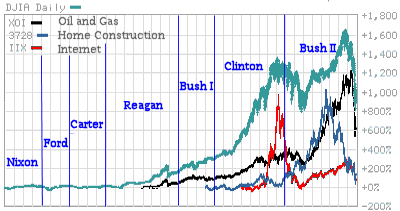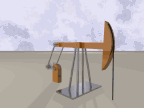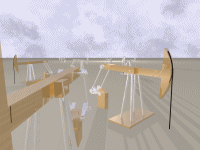
 Looking at the effect of the DOT.COM and HOUSING bubbles on the Stock Market raised a question for me. Why didn’t the bursting of the HOUSING bubble lead to a fall in the Market? Seems like it should’ve, to me [having become a bubble expert since I found out what a bubble was in September (Ha!)]. So I started looking for another bubble. It was easy to find, since it can’t be lost on any of us that the $4+/gallon gas prices have plummeted. So I Googled "Oil Bubble" and found a number of people before prices took a dive [Krugman included] that pooh-poohed the idea that Oil prices shooting up was a sign of a bubble. It was because of "fundamentals" not speculators, they said.
Looking at the effect of the DOT.COM and HOUSING bubbles on the Stock Market raised a question for me. Why didn’t the bursting of the HOUSING bubble lead to a fall in the Market? Seems like it should’ve, to me [having become a bubble expert since I found out what a bubble was in September (Ha!)]. So I started looking for another bubble. It was easy to find, since it can’t be lost on any of us that the $4+/gallon gas prices have plummeted. So I Googled "Oil Bubble" and found a number of people before prices took a dive [Krugman included] that pooh-poohed the idea that Oil prices shooting up was a sign of a bubble. It was because of "fundamentals" not speculators, they said. Well, it quacks like a bubble to me. In fact, what else could it be? The price soars for no apparent reason, then tanks abruptly. This synopsis [and the original linked article] seem explanatory to me:
I read an excellent analysis in ET today of the issues related to the oil bubble. The author, a Chief economist with a US think-tank, addresses each one of the arguments made as to why the oil price rise was related to fundamentals and not speculation. He shows the arguments are dead wrong (quotes from the article in italics):
 The Bull Market since early Clinton days looks like it’s been a Speculator’s Market, bubble after bubble. The Market drove up prices on its own, without underlying substantive "fundamentals" to explain the rapidly escalating prices. This is a sign of a Market that is very dangerous, too unregulated, and ultimately a Market that has done widespread damage to untold numbers of people. All the economists are speculating why people refuse to recognize a bubble when it’s happening. It’s interesting that some of the people who are chiding others for not listening about the HOUSING bubble, are also people who were saying there was no OIL bubble. And now, about those record profits from the Oil Companies? And, by the way, this OIL bubble started when we invaded Iraq.
The Bull Market since early Clinton days looks like it’s been a Speculator’s Market, bubble after bubble. The Market drove up prices on its own, without underlying substantive "fundamentals" to explain the rapidly escalating prices. This is a sign of a Market that is very dangerous, too unregulated, and ultimately a Market that has done widespread damage to untold numbers of people. All the economists are speculating why people refuse to recognize a bubble when it’s happening. It’s interesting that some of the people who are chiding others for not listening about the HOUSING bubble, are also people who were saying there was no OIL bubble. And now, about those record profits from the Oil Companies? And, by the way, this OIL bubble started when we invaded Iraq. Update: So, it looks like I’m no big discoverer after all. Put "oil bubble" in Google, then click "news."
Sorry, the comment form is closed at this time.